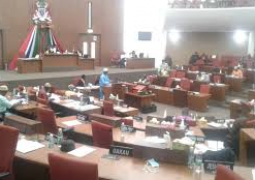
“Assuming that the charge is a proper one, which it is not, we submit, it is clear that if there is no evidence to prove the essential elements of the offence of manslaughter under the section in any event. The charge makes it clear that the “locking” of Muhammed in the vehicle, “caused his death”. We submit there is no evidence of what if anything caused the death of Muhammed and certainly there is no evidence that his death was as a result of any act of the defendants,” he said yesterday, while giving her oral submission on the briefs of the “no to case submission” they filed.
Ida Drammeh added: “In our submission, negligence does not apply to acts under Section 186. It is clear that negligence only applies to an omission, when the section makes it clear that the admission has to amount to “culpable negligence to discharge a duty tending to the preservation of life or health.” If we refer to the charge again, it becomes clear that the charge is itself confused by referring to negligence in relation to the act of leaving Muhammed in the vehicle.”
She maintained that none of the witnesses at the trial proved the charge that the defendants “unlawfully and with negligence left one Muhammed Mbye, a two-year-old locked in the vehicle with registration number BJL 9392 Q for four hours and that as a result of which caused his death.”
“We say this because it is clear from a reading of Section 186 of the Criminal Code that the proof of the following elements are required which is: there must be an unlawful act or omission; the unlawful act or omission must have caused the death of another person and (if any unlawful omission) the unlawful omission must be an omission amounting to culpable negligence to discharge a duty tending to the preservation of life of health.”
“It is our submission that based on the said elements of the offence, the charge brought under Section 186 is unmaintainable; not least because there was no proof of death of Muhammed and equally there was no evidence of any unlawful act or omission of the defendants which caused a death. The law requires that the act must be unlawful, which means that it must constitute a criminal offence in its own right regardless of the fact that it has caused death.”
“In this case, there is no evidence that either of the defendants locked Muhammed Mbye in the vehicle bearing registration number BJL 9392 Q at all, or that they locked him in the said vehicle for four hours, or in fact that following the time Muhammed was placed in the vehicle that he remained in the vehicle continuously. In fact, there is no evidence about the vehicle, no evidence to suggest that its windows were ever up or that there was a need to use a key to open the car at any time amongst other things.”
The no case submission, she went on, is therefore, that there is no evidence adduced by the prosecution on which the court could properly convict him or her, even if it believed the evidence of the prosecution. “In the circumstances therefore, the sole issue for determination at this stage of the trial before this honourable court is; whether from the evidence before the court, the prosecution has established a prima facie case for the defendants to be called upon to enter their defence.
Meanwhile, the state prosecution Yusuf urged the court to dismiss the “no case submission" filed by the defendants. He equally urged the court to ensure that the three defendants open their defence.
Consequently, the presiding Judge, Justice Ebrima Jaiteh adjourned the case to 6 December for ruling of the “no case submission” filed by the defence.





